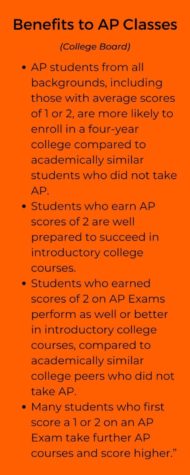Student perspective on AP classes; is the stress worth it?
(Pictured from left to right) freshmen Hallema Bakhda, Mia Taylor and sophomore Kaia Lopez study for their classes.
April 25, 2023

The average number of students in AP classes is increasing rapidly, even in the face of educational obstacles present during the last few years. College Board says the amount of high school students taking AP classes has increased in 2021 from 2011, despite disruptions from COVID.
Beverly offers over twenty AP classes, but these classes can put a lot of pressure on students due to their fast pace and the amount of material covered.
While college-level classes in high school can be academically and intellectually beneficial, this pressure, stress and competition associated with AP classes is crucial to recognize.
Senior Chloe Peykar said, “I have taken two [AP classes]: AP Lit (AP Literature and Composition) and AP Lang (AP Language). It’s the worst. It takes up half my life. [I] stress, go to school, stress, stress and stress.”
“In an AP class, you’re constantly prepping for the exam,” senior Rowan Horowitz said, who is currently taking AP Literature and Composition. “I guess it’s a good way to get credits out of the way, in your college career.”
A lot of the time, students feel they should be taking AP classes because there is no honors class to provide a level between regular and AP.
“The only reason I’m in this class is because there’s no Honors English 12. I wouldn’t do it by choice, I don’t think,” Horowitz said.
Though many students feel stressed about AP classes, some don’t feel as anxious.
One junior, for example, is taking AP Language and AP Computer Science Principles, and she doesn’t feel the same stress others do. “I think my teachers do a good job of spacing out the work, so I haven’t felt that much stress. Sometimes I have a lot of assignments, but for the most part, I’m feeling pretty good,” she said.
Sometimes, if students are willing to work at a laborious level, they won’t feel as anxious in an AP class. College Board says those prepared for the rigor of an AP class should be considered for admission to these courses.
“I only have like two-ish hours of homework, sometimes three or four, but it’s honestly not that bad,” Wi said. “Most of the time it still feels like a high school class to me.”
Besides students’ varying stress levels, they are constantly receiving different messages about AP classes.
For example, College Transitions says students need to take many AP classes to compete for the top of their graduating class, if their goal is an Ivy League school — because weighted GPAs work in favor of students taking AP classes.
But then, according to US News, Shondra Carpenter (a counselor at Cherokee Trail High School in Colorado) says not earning passing grades in AP courses shows colleges that the student was only trying to impress colleges and wasn’t ready for the class.
How can students know what to do when they are receiving these mixed messages? Is it worth it to take an AP class?
Horowitz offers insight. “I think it depends on your grade, to be honest,” Horowitz said. “Also, if you’re taking AP Lit, but you don’t want to be an English major or a liberal arts major, it’s probably not worth it to take the class. Or if you’re going to SMC, I don’t think they care as much as if you’re going to Yale.”
Horowitz points out that it’s important to take an AP class based on interest in the subject, rather than the desire for a glowing transcript. The best circumstance would be finding a balance between taking AP classes to improve chances of future academic success and to learn about a subject of interest.





























